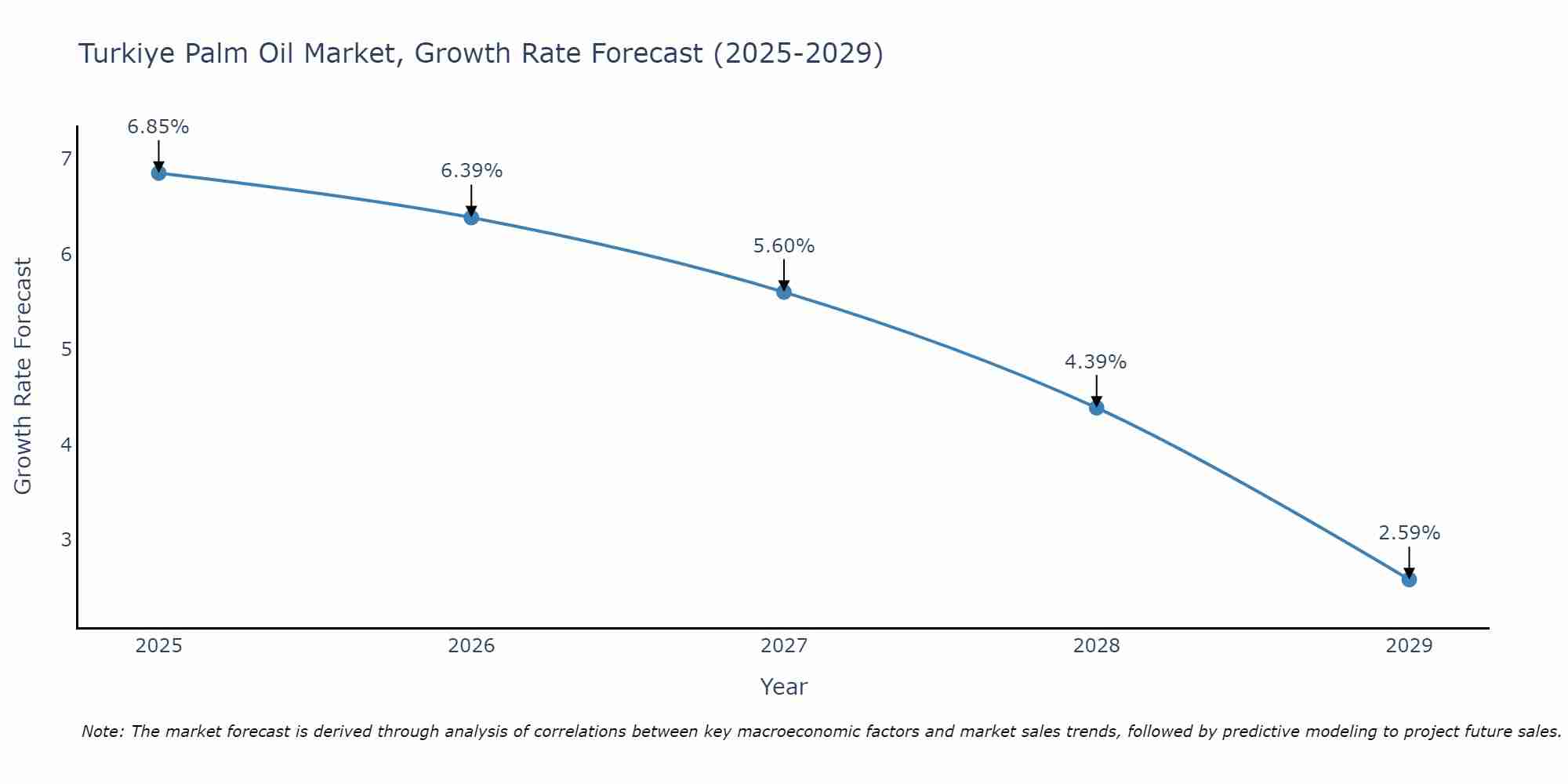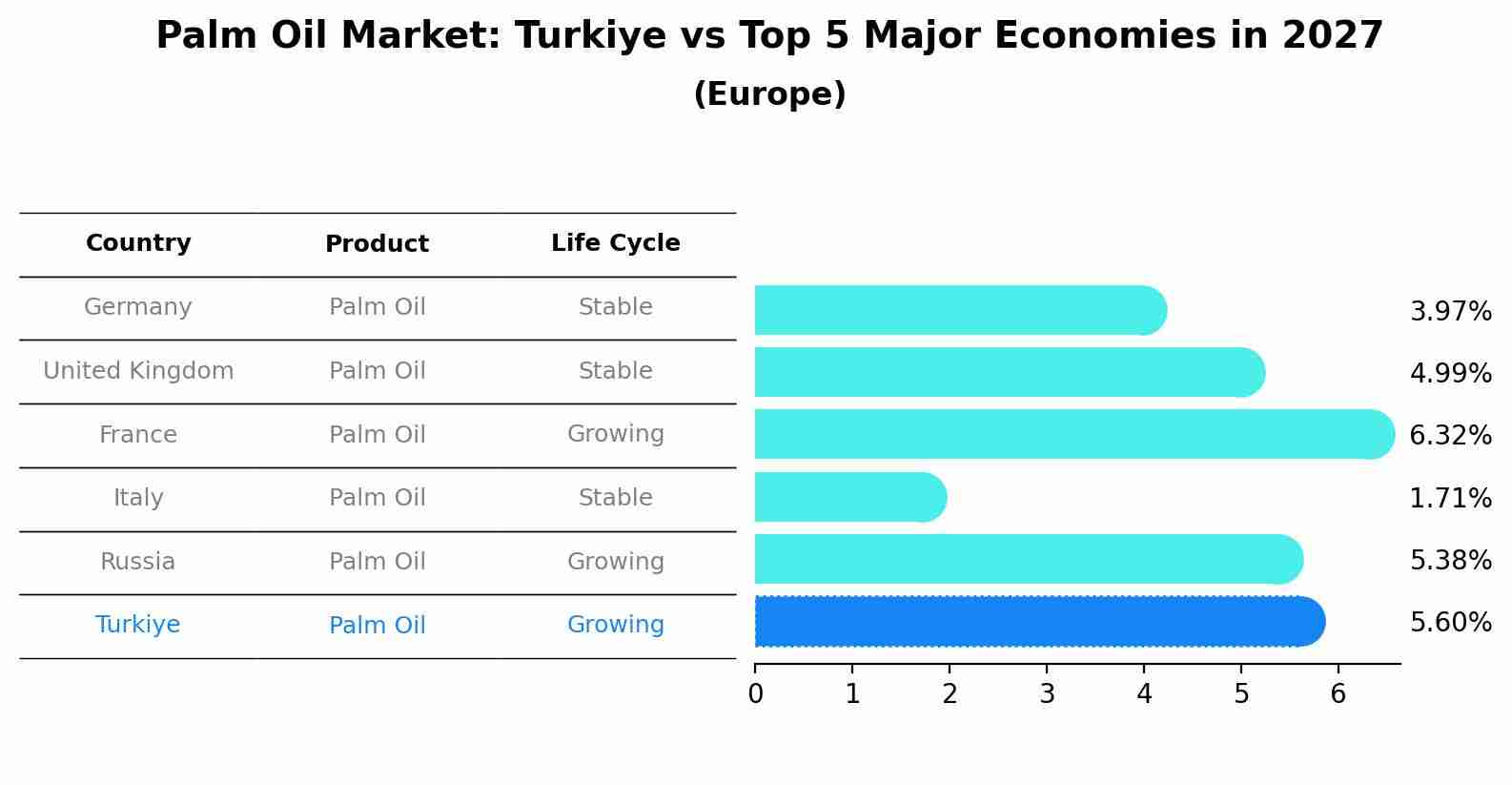Turkey Palm Oil Market Outlook | Analysis, Growth, Share, Value, COVID-19 IMPACT, Forecast, Industry, Trends, Revenue, Size & Companies
| Product Code: ETC383798 | Publication Date: Aug 2022 | Updated Date: Jul 2025 | Product Type: Market Research Report | |
| Publisher: 6Wresearch | Author: Shubham Deep | No. of Pages: 75 | No. of Figures: 35 | No. of Tables: 20 |
Turkiye Palm Oil Market Size Growth Rate
The Turkiye Palm Oil Market could see a tapering of growth rates over 2025 to 2029. Beginning strongly at 6.85% in 2025, growth softens to 2.59% in 2029.

Palm Oil Market: Turkiye vs Top 5 Major Economies in 2027 (Europe)
Turkiye's Palm Oil market is anticipated to experience a growing growth rate of 5.60% by 2027, reflecting trends observed in the largest economy Germany, followed by United Kingdom, France, Italy and Russia.

Turkey Palm Oil Market Synopsis
The Turkey palm oil market is characterized by a growing demand driven by its versatile applications in the food industry, particularly in the production of snacks, baked goods, and processed foods. The country relies heavily on palm oil imports to meet its domestic consumption needs, with Malaysia and Indonesia being the primary suppliers. However, sustainability concerns and changing consumer preferences towards healthier and more environmentally friendly products are influencing the market dynamics. As a result, there is a shift towards sustainable sourcing practices and increased awareness of the environmental impact of palm oil production. The market is expected to witness continued growth, albeit with a focus on sustainable sourcing and processing methods to cater to evolving consumer preferences and regulatory requirements.
Turkey Palm Oil Market Trends
In the Turkey Palm Oil Market, sustainability and environmental concerns are becoming increasingly significant trends. Consumers are becoming more aware of the environmental impact of palm oil production, leading to a growing demand for sustainable and responsibly sourced palm oil products. This has prompted many companies in Turkey to adopt certifications such as RSPO (Roundtable on Sustainable Palm Oil) to demonstrate their commitment to sustainable sourcing practices. Another trend in the Turkey Palm Oil Market is the rising popularity of palm oil alternatives due to health concerns related to saturated fats in palm oil. This has led to a shift towards healthier cooking oils such as olive oil and sunflower oil in the Turkish market. Overall, the Turkey Palm Oil Market is witnessing a shift towards sustainability and healthier alternatives driven by consumer preferences and environmental awareness.
Turkey Palm Oil Market Challenges
In the Turkey Palm Oil Market, several challenges are prevalent. One major issue is the fluctuating global prices of palm oil, which can impact the cost of imports and ultimately affect the pricing for consumers. Additionally, there are concerns regarding the environmental sustainability of palm oil production, as deforestation and habitat destruction are often associated with palm oil plantations. This has led to increased scrutiny from consumers and regulatory bodies, prompting the need for sustainable sourcing practices. Furthermore, competition from other vegetable oils and changing consumer preferences towards healthier alternatives pose a challenge for palm oil producers in Turkey. Overall, navigating these challenges while ensuring sustainable practices and meeting consumer demands presents a complex landscape for players in the Turkey Palm Oil Market.
Turkey Palm Oil Market Investment Opportunities
Investment opportunities in the Turkey Palm Oil Market include potential growth in the food industry due to increasing consumer demand for palm oil as a versatile cooking ingredient. Additionally, the rising popularity of palm oil in the cosmetics and personal care sectors presents opportunities for investment in those industries. With Turkey being a net importer of palm oil, there is a consistent demand for this commodity, making it a stable investment option. Furthermore, the government`s initiatives to promote sustainable palm oil production could attract responsible investors looking to support environmentally friendly practices. Overall, investing in the Turkey Palm Oil Market offers potential for growth and diversification, particularly for investors interested in the food, cosmetics, and sustainable agriculture sectors.
Jordan Agar Market Government Policies
The Turkish government has implemented various policies related to the palm oil market, including imposing tariffs on palm oil imports to protect domestic producers and promote self-sufficiency in edible oils. Additionally, there are regulations in place to ensure the sustainable production and consumption of palm oil in line with environmental and social standards. The government has also introduced labeling requirements to inform consumers about the origin and production methods of palm oil products. Overall, the Turkish government aims to balance the need for palm oil as a key ingredient in various industries with the importance of sustainable sourcing and environmental conservation.
Turkey Palm Oil Market Future Outlook
The future outlook for the Turkey Palm Oil Market appears positive, with steady growth anticipated in the coming years. Factors such as increasing consumer demand for affordable edible oils, growth in the food processing industry, and rising awareness regarding the health benefits of palm oil are expected to drive market expansion. Additionally, palm oil`s versatility in various applications, including food products, cosmetics, and biofuels, will contribute to its sustained demand. However, challenges related to sustainability and environmental concerns may impact the market dynamics, prompting companies to adopt more sustainable practices and certifications. Overall, the Turkey Palm Oil Market is likely to see continued growth opportunities, fueled by changing consumer preferences and expanding industrial applications.
Key Highlights of the Report:
- Turkey Palm Oil Market Outlook
- Market Size of Turkey Palm Oil Market, 2021
- Forecast of Turkey Palm Oil Market, 2031
- Historical Data and Forecast of Turkey Palm Oil Revenues & Volume for the Period 2018 - 2031
- Turkey Palm Oil Market Trend Evolution
- Turkey Palm Oil Market Drivers and Challenges
- Turkey Palm Oil Price Trends
- Turkey Palm Oil Porter's Five Forces
- Turkey Palm Oil Industry Life Cycle
- Historical Data and Forecast of Turkey Palm Oil Market Revenues & Volume By Nature for the Period 2018 - 2031
- Historical Data and Forecast of Turkey Palm Oil Market Revenues & Volume By Organic for the Period 2018 - 2031
- Historical Data and Forecast of Turkey Palm Oil Market Revenues & Volume By Conventional for the Period 2018 - 2031
- Historical Data and Forecast of Turkey Palm Oil Market Revenues & Volume By Product for the Period 2018 - 2031
- Historical Data and Forecast of Turkey Palm Oil Market Revenues & Volume By CPO for the Period 2018 - 2031
- Historical Data and Forecast of Turkey Palm Oil Market Revenues & Volume By RBD Palm Oil for the Period 2018 - 2031
- Historical Data and Forecast of Turkey Palm Oil Market Revenues & Volume By Palm Kernel Oil for the Period 2018 - 2031
- Historical Data and Forecast of Turkey Palm Oil Market Revenues & Volume By Fractionated Palm Oil for the Period 2018 - 2031
- Historical Data and Forecast of Turkey Palm Oil Market Revenues & Volume By End-use for the Period 2018 - 2031
- Historical Data and Forecast of Turkey Palm Oil Market Revenues & Volume By Food & Beverage for the Period 2018 - 2031
- Historical Data and Forecast of Turkey Palm Oil Market Revenues & Volume By Personal Care & Cosmetics for the Period 2018 - 2031
- Historical Data and Forecast of Turkey Palm Oil Market Revenues & Volume By Biofuel & Energy for the Period 2018 - 2031
- Historical Data and Forecast of Turkey Palm Oil Market Revenues & Volume By Pharmaceuticals for the Period 2018 - 2031
- Historical Data and Forecast of Turkey Palm Oil Market Revenues & Volume By Others for the Period 2018 - 2031
- Turkey Palm Oil Import Export Trade Statistics
- Market Opportunity Assessment By Nature
- Market Opportunity Assessment By Product
- Market Opportunity Assessment By End-use
- Turkey Palm Oil Top Companies Market Share
- Turkey Palm Oil Competitive Benchmarking By Technical and Operational Parameters
- Turkey Palm Oil Company Profiles
- Turkey Palm Oil Key Strategic Recommendations
Frequently Asked Questions About the Market Study (FAQs):
- Single User License$ 1,995
- Department License$ 2,400
- Site License$ 3,120
- Global License$ 3,795
Search
Thought Leadership and Analyst Meet
Our Clients
Related Reports
- Afghanistan Rocking Chairs And Adirondack Chairs Market (2026-2032) | Size & Revenue, Competitive Landscape, Share, Segmentation, Industry, Value, Outlook, Analysis, Trends, Growth, Forecast, Companies
- Afghanistan Apparel Market (2026-2032) | Growth, Outlook, Industry, Segmentation, Forecast, Size, Companies, Trends, Value, Share, Analysis & Revenue
- Canada Oil and Gas Market (2026-2032) | Share, Segmentation, Value, Industry, Trends, Forecast, Analysis, Size & Revenue, Growth, Competitive Landscape, Outlook, Companies
- Germany Breakfast Food Market (2026-2032) | Industry, Share, Growth, Size, Companies, Value, Analysis, Revenue, Trends, Forecast & Outlook
- Australia Briquette Market (2025-2031) | Growth, Size, Revenue, Forecast, Analysis, Trends, Value, Share, Industry & Companies
- Vietnam System Integrator Market (2025-2031) | Size, Companies, Analysis, Industry, Value, Forecast, Growth, Trends, Revenue & Share
- ASEAN and Thailand Brain Health Supplements Market (2025-2031) | Strategy, Consumer Insights, Analysis, Investment Trends, Opportunities, Growth, Size, Share, Industry, Revenue, Segments, Value, Segmentation, Supply, Forecast, Restraints, Outlook, Competition, Drivers, Trends, Demand, Pricing Analysis, Competitive, Strategic Insights, Companies, Challenges
- ASEAN Bearings Market (2025-2031) | Strategy, Consumer Insights, Analysis, Investment Trends, Opportunities, Growth, Size, Share, Industry, Revenue, Segments, Value, Segmentation, Supply, Forecast, Restraints, Outlook, Competition, Drivers, Trends, Demand, Pricing Analysis, Competitive, Strategic Insights, Companies, Challenges
- Europe Flooring Market (2025-2031) | Outlook, Share, Industry, Trends, Forecast, Companies, Revenue, Size, Analysis, Growth & Value
- Saudi Arabia Manlift Market (2025-2031) | Outlook, Size, Growth, Trends, Companies, Industry, Revenue, Value, Share, Forecast & Analysis
Industry Events and Analyst Meet
Whitepaper
- Middle East & Africa Commercial Security Market Click here to view more.
- Middle East & Africa Fire Safety Systems & Equipment Market Click here to view more.
- GCC Drone Market Click here to view more.
- Middle East Lighting Fixture Market Click here to view more.
- GCC Physical & Perimeter Security Market Click here to view more.
6WResearch In News
- Doha a strategic location for EV manufacturing hub: IPA Qatar
- Demand for luxury TVs surging in the GCC, says Samsung
- Empowering Growth: The Thriving Journey of Bangladesh’s Cable Industry
- Demand for luxury TVs surging in the GCC, says Samsung
- Video call with a traditional healer? Once unthinkable, it’s now common in South Africa
- Intelligent Buildings To Smooth GCC’s Path To Net Zero


















